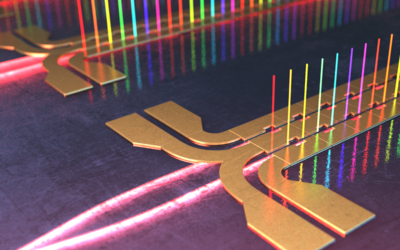What is quantum information science?
Quantum information science marries two of the 20th century’s most important scientific developments: quantum physics and information theory. Quantum physics describes the universe at its smallest and most fundamental scales — think atoms and molecules; light and energy. Information theory underpins the workings of computers and the internet — technologies that have transformed our world. Together, they herald a new technological revolution that could supercharge physics, materials science, chemistry, biomedicine, encryption, communications and many other areas.
Quantum information science involves using the smallest bits of matter and energy — electrons inside an atom, tiny circuits, massless particles of light — to store, carry and process information. Scientists around the world are developing quantum computers, a new kind of machine that can, in theory, simulate the fundamentally quantum nature of matter and tackle certain currently unsolvable problems. Other focus areas of quantum information science include quantum sensors for ultra-high-precision measurements and quantum networks that could link devices across cities, nations and ultimately the globe.
What is NIST’s role?
NIST has been a leader in quantum information science since the early 1990s and continues to shape the field. Quantum effects set fundamental limits on the precision of physical measurements, so as the nation’s measurement science agency, NIST has a key role in studying and developing standards for quantum measurement.
Building on deep expertise with quantum technologies such as atomic clocks and Josephson junctions, NIST scientists developed early building blocks of quantum computing technology, including one of the first quantum logic gates. NIST researchers have also advanced enabling technology for quantum devices, including single-photon detectors and cryogenics. The NIST on a Chip program works to bring quantum sensing and measurement science to industry.
Much of this research has been done in joint NIST-university institutes, including JILA, a partnership with the University of Colorado, and the Joint Quantum Institute and the Joint Center for Quantum Information and Computer Science, both in partnership with the University of Maryland.
NIST has helped nurture and grow the quantum industry. NIST convened some of the earliest scientific meetings on quantum information theory and later launched the Quantum Economic Development Consortium to support the nascent industry. Many leaders in the quantum industry today previously worked at NIST or its joint institutes. With the launch of the National Quantum Initiative in 2018, NIST now supports a whole-of-government quantum science program.
NIST has also taken the lead in developing post-quantum cryptography, which aims to safeguard information from future quantum computers that could break codes widely used today to encrypt data.













